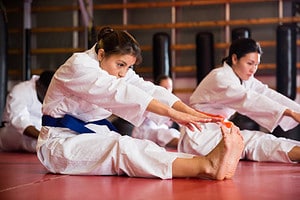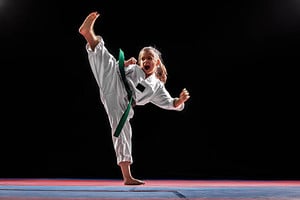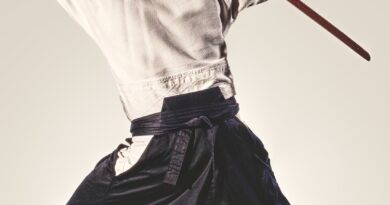Why conditioning is important for martial arts?
The Benefits of Conditioning for Martial Arts: How Improved Strength and Endurance Can Help You Achieve Your Goals
Conditioning is an important part of any martial arts training program. It helps to improve strength and endurance, which can lead to improved performance and better results in competitions. Conditioning can also help to reduce the risk of injury, as well as improve overall health and well-being.
Strength training is an important part of conditioning for martial arts. Strength training helps to build muscle, which can improve power and speed. It can also help to improve balance and coordination, which are essential for martial arts. Strength training can also help to reduce the risk of injury, as it helps to strengthen the muscles and joints.

Endurance training is also important for martial arts. Endurance training helps to improve the body’s ability to perform for longer periods of time. This can help to improve stamina and reduce fatigue, which can help to improve performance in competitions. Endurance training can also help to reduce the risk of injury, as it helps to strengthen the muscles and joints.
Conditioning for martial arts can also help to improve overall health and well-being. Regular exercise can help to reduce stress and improve mental health. It can also help to improve cardiovascular health, which can help to reduce the risk of heart disease and stroke.
In conclusion, conditioning is an important part of any martial arts training program. It can help to improve strength and endurance, which can lead to improved performance and better results in competitions. It can also help to reduce the risk of injury, as well as improve overall health and well-being.
The Science Behind Conditioning for Martial Arts: Understanding the Physiological Benefits of Training
Conditioning is an essential part of martial arts training, as it helps to improve physical performance and reduce the risk of injury. It is important to understand the physiological benefits of conditioning in order to maximize the effectiveness of training. This article will discuss the science behind conditioning for martial arts, including the physiological benefits of training and how to best incorporate conditioning into martial arts training.
The primary goal of conditioning for martial arts is to improve physical performance. This can be achieved through a variety of methods, such as strength training, aerobic exercise, and flexibility training. Strength training helps to increase muscle size and strength, which can improve power and speed. Aerobic exercise helps to improve cardiovascular endurance, which can improve stamina and reduce fatigue. Flexibility training helps to improve range of motion, which can improve technique and reduce the risk of injury.
Conditioning can also help to reduce the risk of injury. Strength training helps to increase muscle size and strength, which can help to protect joints and reduce the risk of injury. Aerobic exercise helps to improve cardiovascular endurance, which can help to reduce fatigue and improve recovery time. Flexibility training helps to improve range of motion, which can help to reduce the risk of muscle strains and other injuries.
In order to maximize the effectiveness of conditioning for martial arts, it is important to understand the physiological benefits of training. It is also important to incorporate conditioning into martial arts training in a way that is appropriate for the individual’s level of fitness and skill. For example, a beginner may benefit from a more basic program that focuses on basic strength and aerobic exercises, while an advanced practitioner may benefit from a more complex program that includes strength, aerobic, and flexibility training.

In conclusion, conditioning is an essential part of martial arts training, as it helps to improve physical performance and reduce the risk of injury. It is important to understand the physiological benefits of conditioning in order to maximize the effectiveness of training. By incorporating conditioning into martial arts training in an appropriate way, practitioners can reap the full benefits of conditioning and improve their overall performance.
Conditioning for Martial Arts: How to Develop a Training Program That Works for You
Conditioning for martial arts is an important part of any martial artist’s training program. It helps to build strength, endurance, and agility, all of which are essential for success in the ring. Developing a conditioning program that works for you can be a challenge, but with the right approach, you can create a program that will help you reach your goals.
The first step in creating a conditioning program is to assess your current fitness level. This will help you determine the type of exercises you should include in your program. You should also consider your goals and the type of martial arts you practice. For example, if you practice a striking art such as Muay Thai, you may want to focus on exercises that build power and speed. If you practice a grappling art such as Brazilian Jiu-Jitsu, you may want to focus on exercises that build strength and endurance.
Once you have determined your goals and the type of martial arts you practice, you can begin to create your conditioning program. Start by selecting exercises that target the muscles you need to develop for your martial arts practice. For example, if you practice Muay Thai, you may want to include exercises such as jump rope, burpees, and plyometric push-ups. If you practice Brazilian Jiu-Jitsu, you may want to include exercises such as pull-ups, squats, and deadlifts.
When selecting exercises, it is important to consider the intensity of the exercise. You should choose exercises that are challenging enough to push you to your limits, but not so difficult that you become injured or exhausted. You should also consider the duration of the exercise. For example, if you are doing a strength-training exercise, you may want to do sets of 8-12 repetitions. If you are doing a cardio exercise, you may want to do intervals of 30-60 seconds.
Finally, you should consider the frequency of your conditioning program. You should aim to do your conditioning program at least three times a week. This will help you build strength and endurance over time. However, you should also allow yourself time to rest and recover between workouts.
By following these steps, you can create a conditioning program that works for you and helps you reach your martial arts goals. With dedication and hard work, you can become a stronger, faster, and more agile martial artist.
Conditioning for Martial Arts: The Role of Nutrition in Achieving Optimal Performance
Nutrition plays an essential role in achieving optimal performance in martial arts. Proper nutrition is essential for providing the body with the energy and nutrients it needs to perform at its best. It is important to understand the role of nutrition in martial arts conditioning and how to use it to maximize performance.
The first step in optimizing nutrition for martial arts conditioning is to understand the body’s energy needs. During martial arts training, the body needs energy to perform the various movements and techniques. This energy comes from the food we eat. The body breaks down carbohydrates, proteins, and fats into energy that can be used for physical activity. It is important to consume the right balance of these macronutrients to ensure that the body has enough energy to perform at its best.
In addition to providing energy, proper nutrition is also important for muscle growth and recovery. During martial arts training, the muscles are put under a great deal of stress. To ensure that the muscles can recover and grow, it is important to consume adequate amounts of protein. Protein helps to build and repair muscle tissue, which is essential for optimal performance.
Finally, proper nutrition is important for maintaining a healthy immune system. During martial arts training, the body is exposed to a variety of germs and bacteria. To ensure that the body is able to fight off these germs, it is important to consume a balanced diet that includes plenty of fruits and vegetables. These foods are rich in vitamins and minerals that help to boost the immune system and keep the body healthy.
In conclusion, proper nutrition is essential for achieving optimal performance in martial arts. It is important to understand the body’s energy needs and to consume the right balance of macronutrients. Additionally, it is important to consume adequate amounts of protein to ensure muscle growth and recovery. Finally, it is important to consume a balanced diet that includes plenty of fruits and vegetables to maintain a healthy immune system. By following these guidelines, martial artists can ensure that they are getting the nutrition they need to perform at their best.
Conditioning for Martial Arts: How to Overcome Mental Barriers and Reach Your Goals
Mental barriers can be a major obstacle to achieving success in martial arts. Whether you are a beginner or an experienced martial artist, it is important to understand how to overcome these mental barriers in order to reach your goals. This article will provide an overview of the mental barriers that can prevent martial artists from reaching their full potential, as well as strategies for overcoming them.
The first mental barrier that martial artists often face is fear. Fear can be a powerful emotion that can prevent martial artists from taking risks and pushing themselves to their limits. To overcome this fear, it is important to focus on the positive aspects of martial arts, such as the physical and mental benefits that come with training. Additionally, it is important to remember that fear is a natural emotion and that it is okay to feel scared. Acknowledging and accepting this fear can help to reduce its power and allow martial artists to take risks and push themselves further.
Another mental barrier that martial artists often face is self-doubt. Self-doubt can be a major obstacle to progress, as it can lead to a lack of confidence and a feeling of being overwhelmed. To overcome this barrier, it is important to focus on the progress that has been made and to celebrate small successes. Additionally, it is important to remember that mistakes are part of the learning process and that it is okay to make them.
Finally, martial artists may also face the mental barrier of perfectionism. Perfectionism can lead to a feeling of being overwhelmed and can prevent martial artists from taking risks and pushing themselves to their limits. To overcome this barrier, it is important to focus on the process of learning and to celebrate small successes. Additionally, it is important to remember that mistakes are part of the learning process and that it is okay to make them.
By understanding and acknowledging the mental barriers that can prevent martial artists from reaching their full potential, it is possible to develop strategies for overcoming them. By focusing on the positive aspects of martial arts, acknowledging and accepting fear, celebrating small successes, and remembering that mistakes are part of the learning process, martial artists can overcome these mental barriers and reach their goals.



